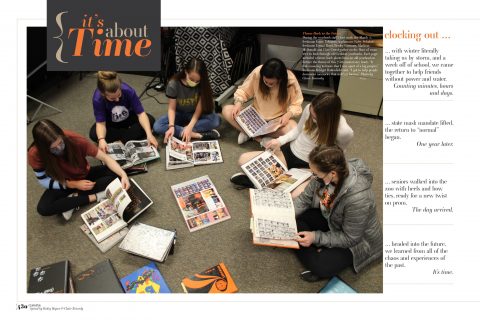A yearbook editor I knew was proactive in guarding against ethical abuse practiced by anyone on the publication staff. On the first day of school, she had each staff member complete a questionnaire, and she reviewed the answers at each deadline when copy and layouts were submitted.
One item on the questionnaire requested the respondent to write down the names of his/her 10 closest high school friends. That list was checked against the staff member’s completed pages to see how many of those named were pictured or quoted on the pages. The practice helped protect against preferential treatment of friends in covering the issues and activities of the school year.
Another request was to list all academic courses and extracurricular activities the respondent planned to join. It’s a good idea to know if your yearbook reporter has a vested interest in the beat that he/she is covering. Objectivity is just as important in a yearbook as it is in a student newspaper.
Other questions identified prejudices (What things do you most like/least like about our school?), measured work ethic (What evidence shows your leadership, your initiative and your perseverance in school?), reflected ethical values (Does the end justify the means? Can you think of any occasion when you would use a photo from the Internet without first getting permission from the copyright owner?), and probed for other insights that could raise ethical “red flags.”
The editor, too, completed the questionnaire for the adviser to use in checking the editor’s own ethical practices. Even though a righteous student leader may have the best of intentions, there is a subliminal nature to every person whereby the person may not have a conscious awareness of an ethical breach. Every staff member and the adviser should be cautious not to use their yearbook position as a platform for unfairly disseminating personal perspectives that serve self-interests and improperly steal the focus of attention from the reader and the school coverage.
Although some ethical gaffes are unintended, there may be staff members who are deliberately malicious.
Some students join a yearbook staff mostly because they want power and prestige. They use their position for self-promotion, for rewarding friends and for punishing adversaries. Their vision is reflected by a mirror rather than projected in panoramic service to the entire school community. Their motivation is not to serve the interests of subscribers but rather to advance their own, self-serving agenda.
Students who quit the yearbook staff because they were not appointed to the leadership position they sought are highly suspect in their ability to model noble ethics anyway. The staff is better off without their services. Those who believe that position is more important than performance are misguided. Their motivation seems inspired more by the quest for extrinsic rewards than by the intrinsic desire to provide service to the school community.
Every day, every yearbook staff member should remind himself about an awesome responsibility that attends his work. That responsibility is to balance the right to decide with concern for the right thing to do. Power tempered by ethics serves righteousness and enhances the quality of judgment used in producing a great yearbook that can be enjoyed by everyone.
Students on the yearbook staff should be assertive in protecting the publication from those who would use it to inflate their egos and advance selfish motives. The entire staff should strategize ways to develop a system for checks and balances, and ethics should be a regular topic of discussion.
Every decision has an ethical dimension, and a proactive approach is the best way to serve yearbook subscribers and the school community.




